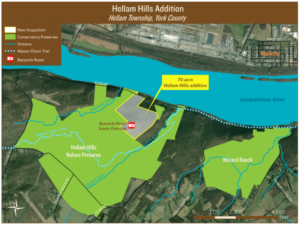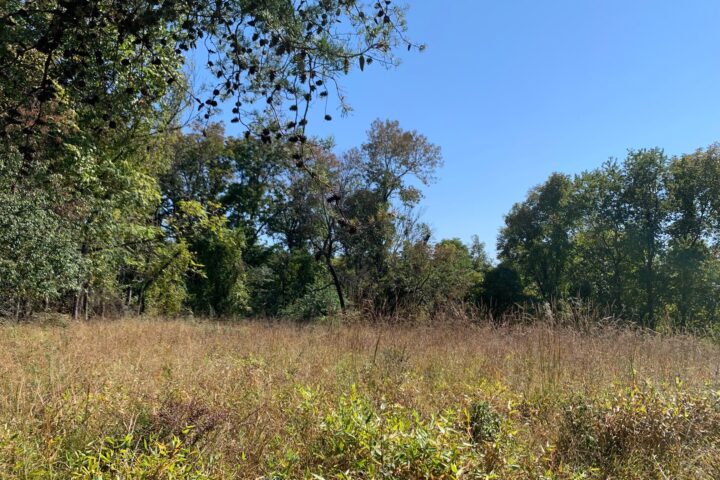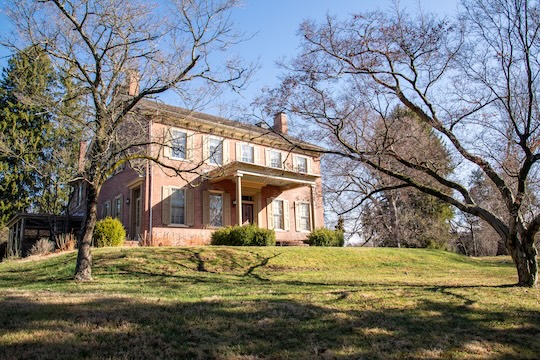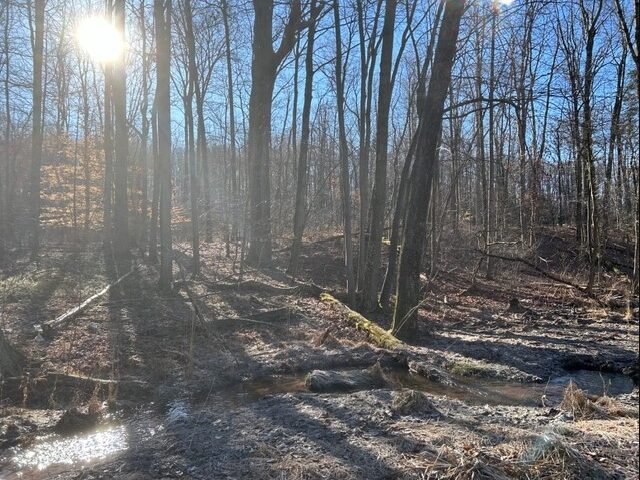 The Lancaster Conservancy announced the acquisition of a 70-acre addition to Hellam Hills Nature Preserve in York County. With this acquisition, Hellam Hills Nature Preserve grows to nearly 800 contiguous, protected acres. The total land in Hellam Hills Conservation Area now exceeds 1,000 acres.
The Lancaster Conservancy announced the acquisition of a 70-acre addition to Hellam Hills Nature Preserve in York County. With this acquisition, Hellam Hills Nature Preserve grows to nearly 800 contiguous, protected acres. The total land in Hellam Hills Conservation Area now exceeds 1,000 acres.
This land in Hellam Township was purchased with financial assistance from the Pennsylvania Department of Conservation and Natural Resources (DCNR), Bureau of Recreation and Conservation, who awarded the project a grant from the Keystone Recreation, Park and Conservation Fund. Brookfield Renewable donated a 173-acre tract in Lower Chanceford Township along McCalls Ferry Road as the match to DCNR funding, along with private donations. The seller Ralph Streibig donated part of the value of the land in memory of his husband, Richard L. King, and King’s family, who loved this land and worked tirelessly to preserve it for future generations.
“Acquisition of this invaluable tract within the Susquehanna Riverlands Conservation Area truly provides so much to so many,” said DCNR Secretary Cindy Adams Dunn. “Again, working closely with the Lancaster Conservancy, this department is very proud to be a part of that effort.”
Brookfield Renewable’s Senior Director of Strategic Relationships Andy Davis said, “The [Lancaster Conservancy] has been a tremendous partner of ours, and we are proud to have played a role in their preservation and protection of beautiful lands throughout the region. We continue to be amazed with the [Conservancy’s] tenacity in meeting their objectives as well as the innovative and collaborative efforts that they undertake in order to meet their goal of saving natural lands and ensuring public accessibility to enjoy these lands.”
Protection of these 70 acres contributes to fostering one of the last true interior forests in this area. Since 2011, the Conservancy has worked tirelessly to preserve this area known as Hellam Hills with their first purchase in 2016. This new acquisition includes Buzzards Roost, an approximately 840-foot peak recognized in USGS maps, unmistakable when driving into Marietta or walking along the Northwest River Trail. The Conservancy is working with the Mason-Dixon Trail Association to re-route the Mason-Dixon Trail to the overlook at Buzzards Roost.
With Chesapeake Gateways funding from the National Park Service (NPS) and support through DCNR’s Conservation Landscape program, the Conservancy began a collaborative master planning process, which will take place in 2021, for the Hellam Hills Conservation Area. “The National Park Service is pleased to be able to provide Gateways funds to assist the Conservancy in planning for welcoming and appropriate public access to the Hellam Hills Nature Preserve,” said Wendy O’Sullivan, NPS Chesapeake Superintendent.
This planning process will include opportunities for state, county, municipal, and land management partners to be involved, along with neighbors of the preserves and residents of Hellam Township and Wrightsville Borough. “It’s very important to the Conservancy that we balance the many environmental, ecological, historic, and recreational needs of these lands, and do so in a way that is truly wholistic and inclusive of input from the local community and the many partners working diligently to protect natural places throughout the Susquehanna Riverlands,” remarked Brandon Tennis, Senior VP of Stewardship at the Conservancy. Additional information on opportunities to be involved in the master planning process for the Hellam Hills Conservation Area will be released in spring of 2021.
The forested lands of Hellam Hills are within the DCNR conservation landscape known as the Susquehanna Riverlands. The Conservancy serves as the community lead for land protection, stewardship, and community initiatives within the Susquehanna Riverlands. “Protecting these wooded hills of the Susquehanna Riverlands in Hellam Township requires partnerships with local, county, state, and federal government, as well as other organizations and land managers. The Conservancy is thrilled to lead that process as we expand this conservation area over the next decade for public enjoyment, habitat, and natural sustainability,” said Phil Wenger, President at the Conservancy.




